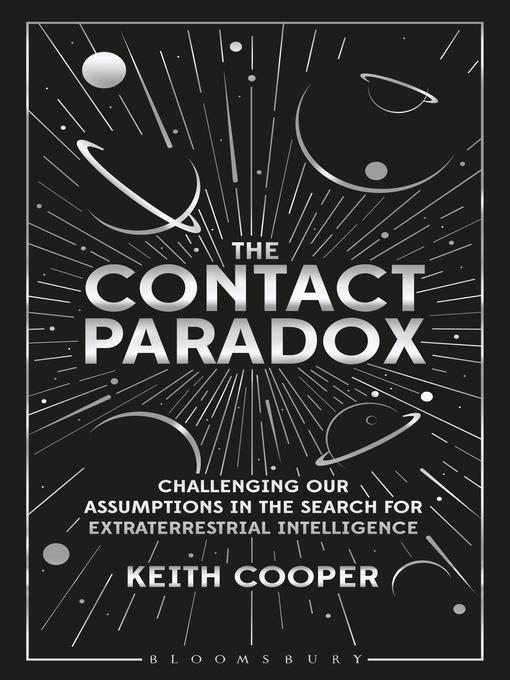
The Contact Paradox
Challenging our Assumptions in the Search for Extraterrestrial Intelligence
کتاب های مرتبط
- اطلاعات
- نقد و بررسی
- دیدگاه کاربران
نقد و بررسی

Starred review from October 7, 2019
Debut author Cooper, the editor of Astronomy Now and Astrobiology Magazine, lays out the possibilities, good and bad, humanity faces in contemplating alien contact in his intriguing study. He opens in 1967, with an epochal astronomical discovery. While searching for radio signals from quasars, PhD student Jocelyn Bell picked up a powerful pulse that repeated every 1.3 seconds. The signal turned out to be from a spinning neutron star—a pulsar—rather than “little green men,” but scientists began to think more seriously about the consequences of contacting extraterrestrials. For instance, to what degree might they share humans’ innate “proclivity for altruism toward individuals that we’re not related to,” as opposed to another widespread human trait—xenophobia? And even if intelligent life exists elsewhere in the universe, would humans recognize it as such? Cooper observes that “if technology is not ubiquitous with intelligence,” then the dominant current model for detecting extraterrestrial sentience, via radio signals and other signs of technological activity, might all be in vain. Exploring these and many other concerns with concise and approachable writing, Cooper crafts a worthwhile popular science work about questions that, as scientists continually improve the human capacity for gathering information about the rest of the universe, are becoming increasingly important.

November 1, 2019
An overview of the search for intelligence on distant planets. In his first book, Cooper, science writer and editor of Astronomy Now, emphasizes that the universe teems with extrasolar planets, but evidence of life remains out of reach, to the frustration of almost everyone, including scientists working at the Search for Extraterrestrial Intelligence Institute, which has been looking for more than 50 years. The sci-fi trope of the evil alien has largely fallen out of fashion. From the hit movie ET to Congress, which killed SETI funding in 1993, almost everyone today agrees that intelligence on distant planets is worth searching for. Traveling the world, Cooper chronicles his interviews with scientists and scholars who discuss how to do it and what we might find, if anything. Throughout, the author is free with his own opinions, and there is no shortage of surprises, the first of which is the chapter on altruism. Why should extraterrestrial visitors have benign intentions? "Our present beliefs about alien civilizations are built on the basis of taking the best parts of our humanity and extrapolating them into the future," writes Cooper. "It's an easy trap to fall into." He reminds readers of the disastrous history of human explorers who encountered strange cultures. Do smart aliens even exist? Experts can't decide if--like an elephant's trunk or giraffe's neck--intelligence is a chance byproduct of evolution or a regular feature such as eyes, limbs, or wings. Cooper recounts the debate between "rare Earth" experts who believe we may be unique with those who disagree, but it remains an area of pure (and frustrating) speculation. Discussions on technical aspects of searching contain more satisfying answers. Provided distant aliens possess transmitters an order of magnitude more powerful than ours, today's receivers can detect the signal. Sending an actual message--as opposed to a mere signal--requires vastly more power. "Are we alone in the universe?" has no answer yet, but Cooper delivers an enlightening exploration of the question.
COPYRIGHT(2019) Kirkus Reviews, ALL RIGHTS RESERVED.

December 1, 2019
The search for extraterrestrial intelligence (SETI) has not detected anything. The question of whether that's because no life exists beyond Earth, let alone alien intelligence, or because Earthlings aren't hunting optimally drives science journalist Cooper's survey of SETI's past and possible future. Cooper begins with the progenitor of SETI, Frank Drake, and the search for planets in habitable solar zones. A few have been found, but it's likely that there are an inconceivable number in the rest of the Milky Way, an indication of SETI's immense search field that augurs either its futility or eventual success. A researcher has to decide which part of the electromagnetic spectrum to listen to, which astronomical objects to focus on, and whether to proactively send a message from Earth. (Drake did that in 1974; no reply yet.) Coverage of researchers' projects and ideas, which include sending fleets of robots to nearby stars, is of particular interest. Concluding with the title's paradox: human curiosity motivating SETI versus the unknown risk to humanity of making contact with ET, Cooper delivers an exciting, provocative tome to which science buffs will flock.(Reprinted with permission of Booklist, copyright 2019, American Library Association.)

























دیدگاه کاربران